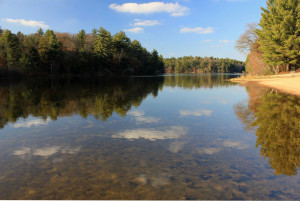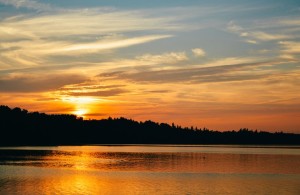 Michigan is a beautiful place, and we are blessed with abundant lakes. While many of these are protected resources, we are fortunate to have many waterfront properties for sale. Whether you love paddleboating in the spring, wakeboarding in the summer, or ice fishing in winter, lakefront living is great.
Michigan is a beautiful place, and we are blessed with abundant lakes. While many of these are protected resources, we are fortunate to have many waterfront properties for sale. Whether you love paddleboating in the spring, wakeboarding in the summer, or ice fishing in winter, lakefront living is great.
However, waterfront homes in West Michigan come with many extra challenges. To keep you from being blindsided, here are four crucial things you need to check BEFORE you buy a Grand Rapids lake house.
1. Structure and Damage
Lake houses take a lot more abuse than inland homes. This is due to different factors, including added moisture in the air, reduced tree protection from the elements, and more extreme temperature changes. As a result, it can be considerably more expensive to properly maintain a lake house in Grand Rapids.
In addition, many waterfront homes were initially built as cottages. We often see signs of rushed construction, reduced insulation, and cheaper materials throughout lake houses. Because of this, they can become run down faster than average.
Whenever possible, get an inspector who has experience with this type of home. They are quicker to identify waterfront-specific problems, and can often recommend contractors with experience in fixing them.
Make sure they check the foundation and build of the home. Since the coasts of a lake have higher water table, it’s very common to see homes without basements. This changes the structure and foundation of the building, and you want to make sure your home is solid.
 2. Restrictions and Regulations
2. Restrictions and Regulations
Since the lake is a shared resource (both for homeowners, visitors, and wildlife), there are nearly always rules governing its use. For instance, there are probably restrictions on what kinds of watercraft you can use, when you can use them, and whether or not you’re allowed to build a seawall. Are you allowed to build a new dock? Can you put a volleyball net in the water? You should check these rules BEFORE purchasing the property.
There may be government and deed restrictions on the property as well. Since the lake is an ecosystem all its own, the Department of Environmental Quality often has its own rules for waterfront houses. You may face deed restrictions, conservation easements, and extra inspections.
None of these things need to prevent you from buying the home. However, it is important to go in understanding the whole picture!
3. Homeowner Associations
Many lake houses around Grand Rapids are part of an association. The formality of these groups varies widely. Some meet casually a couple of times a year to talk about major issues, and others have full boards of directors and monthly meetings.
These groups serve an important function, and help maintain a good standard of living around the lake. However, there are also rules, regulations, and fees that come with homeowner associations. Get a copy of the HOA information in advance, and make sure you’re willing to abide by those rules.
Lakes around Grand Rapids come in all shapes and sizes. From 35-acre fishing spots to 2,600+ acre all-sports behemoths, there are a lot of choices available.
Make sure you choose the right lake for you. If you prefer quiet sunsets and peaceful views at noon, don’t buy on a popular water skiing lake. If you want to zip around on a Jet Ski, don’t choose a spot where you can only make one small circle over and over. And if you want to fish, make sure the trout are biting!
If possible, visit the lake at a couple of different times of year, and make sure you like the vibe. Living on the water feels very different in January and August, and you’ll want to know that it’s the right house for you.
So jump in, and don’t be afraid to get your feet wet!
